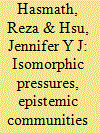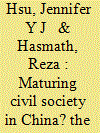| Srl | Item |
| 1 |
ID:
141142


|
|
|
|
|
| Summary/Abstract |
The emergence of China as a development actor across the global South has raised significant questions regarding the extent to which the country presents new development opportunities to its compatriots in the South. My aim is to reflect on and parse out the experiences and policies that have shaped China’s development to assess how it can inform the field of development studies. I argue that we need to critically engage in China’s development process, as China’s own development has led to the emergence of many more problems than solutions, ranging from increasing inequality to exclusionary development practices pertaining to ethnic minorities.
|
|
|
|
|
|
|
|
|
|
|
|
|
|
|
|
| 2 |
ID:
141103


|
|
|
|
|
| Summary/Abstract |
This article suggests that the lack of meaningful collaboration between the state and NGOs in China is not solely a result of the state seeking to restrict the development of the sector, or the fear of a potential opposing actor to the state; instead, interviews with NGOs in Beijing and Shanghai suggest that a lack of meaningful engagement between the state and NGOs can be partially attributed to isomorphic pressures within state–NGO relations, and insufficient epistemic awareness of NGO activities on the part of the state. In fact, the evidence suggests that once epistemic awareness is achieved by the state, it will have a stronger desire to interact with NGOs – with the caveat that the state will seek to utilize the material power of NGOs, rather than their symbolic, interpretive or geographical capital.
|
|
|
|
|
|
|
|
|
|
|
|
|
|
|
|
| 3 |
ID:
151965


|
|
|
|
|
| Summary/Abstract |
This article suggests that Chinese NGOs do not have the conviction that they are part of an epistemic community in mainland China. Interviews conducted in four cities, Chongqing, Kunming, Nanjing and Shanghai, suggest that this can be attributed to a lack of set standards and professionalization governing their sector of operation. Further, the study finds that Chinese NGOs do not see knowledge production as their primary role within their organizational development life cycle. This may indicate a varying path towards the maturation of civil society in China, whereby Chinese NGOs do not conform to the organizational development process as outlined in extant NGO literature.
|
|
|
|
|
|
|
|
|
|
|
|
|
|
|
|